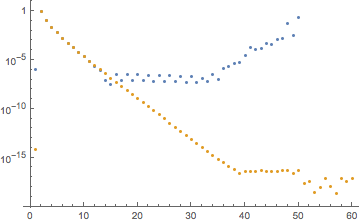I am trying to integrate an analytic function:
Func[Θ_, ϵ_] = (π (28 + (-2 + \
ϵ) ϵ (16 + (-2 + ϵ) ϵ (29 + (-2 + \
ϵ) ϵ (62 + 15 (-2 + ϵ) ϵ))) +
2 (-17 + (-2 + ϵ) ϵ (-22 + (-2 + \
ϵ) ϵ (5 +
2 (-2 + ϵ) ϵ (32 +
3 (-2 + ϵ) ϵ)))) Cos[\
Θ] + (-1 + ϵ)^2 (4 + (-2 + ϵ) \
ϵ (12 + (-2 + ϵ) ϵ (59 +
3 (-2 + ϵ) ϵ))) Cos[
2 Θ] +
2 (-1 + ϵ)^4 (1 +
4 (-2 + ϵ) ϵ) Cos[3 Θ] -
6 (-2 + ϵ)^4 ϵ^4 Csc[Θ/
2]^2))/(6 (-1 + ϵ)^4 (-1 + (-2 + ϵ) \
ϵ + (-1 + ϵ)^2 Cos[Θ])^2) +
Log[(2 - ϵ)/ϵ] (
4 π (-1 + ϵ)^2 (2 + (-2 + ϵ) ϵ) -
2 π (4 +
3 (-2 + ϵ) ϵ (2 + (-2 + ϵ) \
ϵ)) Cos[Θ])/(-1 + ϵ)^5 -
Log[((1 - ϵ) Sin[Θ/2] +
Sqrt[(2 - ϵ) ϵ + (1 - ϵ)^2 Sin[\
Θ/2]^2])/
Sqrt[(2 - ϵ) ϵ]]/((2 - ϵ) ϵ \
+ (1 - ϵ)^2 Sin[Θ/2]^2)^(5/2) π /(
4 ((-1 + ϵ)^5) )
Csc[Θ/
2]^3 (-(-2 + ϵ)^5 ϵ^5 - (-2 + ϵ)^4 \
ϵ^4 (4 + 5 (-2 + ϵ) ϵ) Sin[Θ/
2]^2 + 10 (-2 + ϵ)^3 (-1 + ϵ)^2 \
ϵ^3 (-4 +
3 (-2 + ϵ) ϵ) Sin[Θ/2]^4 -
40 (-2 + ϵ)^2 (-1 + ϵ)^4 ϵ^2 (-6 + \
(-2 + ϵ) ϵ) Sin[Θ/2]^6 +
16 (-2 + ϵ) (-1 + ϵ)^6 ϵ (-20 + (-2 \
+ ϵ) ϵ) Sin[Θ/2]^8 +
128 (-1 + ϵ)^8 Sin[Θ/2]^10);
I can do it using NIntegrate, but it doesn't give very accurate details:
A = Table[
1/(2 n + 1)
NIntegrate[
Sin[Θ] LegendreP[n,
Cos[Θ]] Func[Θ, 1/
10], {Θ, 0 + 10^-3, π - 10^-3},
PrecisionGoal -> 100, AccuracyGoal -> 100], {n, 1, 50}]
returns
{-1.07674*10^-6, 0.949863, 0.114375, 0.0230668, 0.00586787, \
0.00169616, 0.000530953, 0.000174369, 0.0000597002, 0.0000203903,
7.37619*10^-6, 2.21039*10^-6, 8.83215*10^-7, -7.5787*10^-8,
3.47186*10^-8, -3.41165*10^-7, -7.25632*10^-8, -3.43366*10^-7, \
-7.9973*10^-8, -3.15529*10^-7, -7.47012*10^-8, -2.8831*10^-7, \
-6.86621*10^-8, -2.6488*10^-7, -6.33192*10^-8, -2.4487*10^-7, \
-5.86535*10^-8, -2.27233*10^-7, -5.43555*10^-8, -2.06886*10^-7, \
-5.18649*10^-8, -1.38998*10^-7, -6.71511*10^-8, -3.63283*10^-7,
1.10033*10^-7, -1.21779*10^-6, 1.98552*10^-6, -4.25593*10^-6,
5.26844*10^-6, -0.0000319476, 0.000205053, -0.00010609, 0.000150802, \
-0.000543319, 0.000401249, 0.00114871, -0.00146559, 0.0516983, \
-0.00297781, -0.222248}
so somewhere near n = 15, the accuracy can no longer keep up. That's fine, I wrote myself a Gaussian quadrature function to tackle this:
GaussQuadInt[CorrCurve_, ϵ_,
Lmin_, Lmax_, nPoints_] :=
Block[{Coefficients, LegendrePDiff, CorrFunction, GaussLegendreNodes,
GaussLegendreWeights, CorrFunctionVals},
LegendrePDiff[l_, x_] = D[LegendreP[l, y], y] /. {y -> x};
CorrFunction =
Compile[{{Θ, _Real}},
Evaluate@CorrCurve[Θ, ϵ]];
GaussLegendreNodes =
Sort[N[x /. Solve[LegendreP[nPoints, x] == 0], 100]];
GaussLegendreWeights =
ParallelTable[
2/((1 - GaussLegendreNodes[[i]]^2) LegendrePDiff[nPoints,
GaussLegendreNodes[[i]]]^2), {i, 1, nPoints}];
CorrFunctionVals =
ParallelTable[
N[CorrFunction[ArcCos[GaussLegendreNodes[[i]]]], 100], {i, 1,
nPoints}];
Coefficients = Table[
1/(2 l + 1)
ParallelSum[
GaussLegendreWeights[[i]] LegendreP[l,
GaussLegendreNodes[[i]]] CorrFunctionVals[[i]], {i, 1,
nPoints}]
, {l, Lmin, Lmax}];
Return[Coefficients];]
which I then use to perform the same computation:
newCoeffs = GaussQuadInt[Func, N[1/10, 100], 1, 60, 200]
and it gives:
{6.14323*10^-15, 0.949866, 0.114376, 0.0230682, 0.00586816, \
0.00169716, 0.000531168, 0.000175133, 0.0000598703, 0.0000210084,
7.51663*10^-6, 2.72966*10^-6, 1.00285*10^-6, 3.71855*10^-7,
1.38916*10^-7, 5.22141*10^-8, 1.97254*10^-8, 7.48358*10^-9,
2.84942*10^-9, 1.08827*10^-9, 4.16741*10^-10, 1.59952*10^-10,
6.15151*10^-11, 2.36992*10^-11, 9.14443*10^-12, 3.53327*10^-12,
1.36687*10^-12, 5.29339*10^-13, 2.05214*10^-13, 7.96245*10^-14,
3.09582*10^-14, 1.20238*10^-14, 4.69478*10^-15, 1.84874*10^-15,
7.27753*10^-16, 2.92705*10^-16, 1.40073*10^-16, 6.39707*10^-17,
2.42422*10^-17,
4.28862*10^-17, -4.28038*10^-17, -3.89701*10^-17, -5.00079*10^-17, \
-4.22961*10^-17, -3.92505*10^-17, -3.66997*10^-17, -4.47741*10^-17, \
-4.34709*10^-17, -2.59858*10^-17, -4.62965*10^-17, 2.22314*10^-18,
3.54379*10^-18, 2.43186*10^-19, 8.99192*10^-19,
6.97015*10^-18, -1.23964*10^-18, 1.96099*10^-19,
8.13244*10^-18, -3.48402*10^-18, 7.02491*10^-18}
which, unfortunately, loses accuracy too, around n = 40. Here is a plot to illustrate my issue, blue dots are the result of NIntegrate, orange dots are the result of my Gaussian quadrature computation:

What can I do to get a better accuracy of this integration?

NIntegratebased solution did you already try specifying a higherWorkingPrecision? $\endgroup$